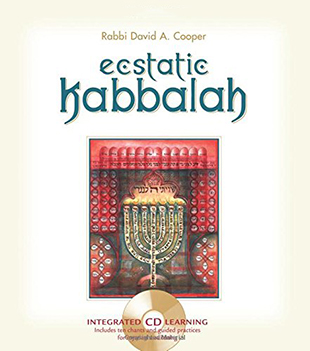"Flying, walking through walls, and manifesting gold out of lead are interesting metaphors for the enlightened being, but what is truly astonishing is the ability to have a soft heart toward all those who have caused us harm, to care deeply for all who suffer, or to turn away from revenge, hostility, or violence under all conditions," writes Rabbi David A Cooper in this book, which has an accompanying CD. He has been called "one of today's leading teachers of Jewish meditation," and his bestselling God Is A Verb: Kabbalah and the Practice of Mystical Judaism has been translated into several languages and sold over 100,000 copies. In this sturdy little volume, Cooper presents the basics of ecstatic Kabbalah, which is built on the principle "that the light of universal truth is always present at all times." The practices described here and demonstrated on the CD have been used for centuries by Jewish mystics. They can now be used by anyone who is "sincerely committed to personal spiritual development." One of the offshoots of diligently using these meditation practices is peace of mind: "Peace of mind does not result from the attempt to control our lives. In fact, it is just the opposite. It comes from the wisdom that is illuminated when we learn how to relax in a way that allows us to 'be with what is.' In our practice, we learn how to engage in something when it is appropriate and how to disengage as well. Peace of mind comes from recognizing how one sits into the scheme of things, the degree to which all life is interconnected, and the realization that nobody is ever alone."
Among the practices you will find here are a Yah breathing meditation that is designed to quiet your mind; a melodic chant for receiving Divine love; the Shema chant to inspire introspection and personal growth; chants from the great mystic Abulafia for invoking clarity and creativity; and a meditation on the thirteen attributes of God including humility, compassion, grace, patience, kindness and letting go. Another offshoot of using these practices is a "big mind," by which Cooper means a mind that "recognizes each moment as perfect, just the way it is. Big mind is equanimous about matters (but not apathetic), and it is sharply aware of the conditioning that lies under all of our activities. Big mind is never dissatisfied with the way things happen; it is a calm, expansive, spacious state. It sees clearly the mystery of life and rests comfortably in the state of 'not knowing' what is going to happen from moment to moment. Small mind has an urge to be in some kind of control; big mind recognizes that the intrinsic nature of creation is unknowable and uncontrollable."
This is a fine resource from a Rabbi who knows the riches and depths of the Kabbalah tradition.
